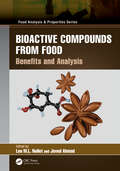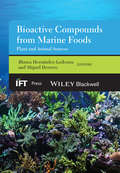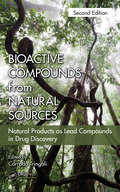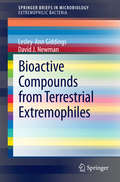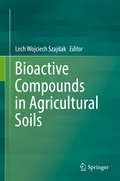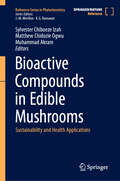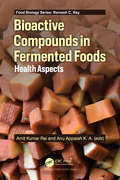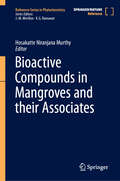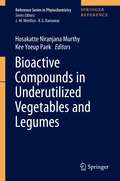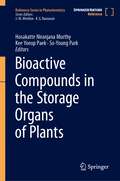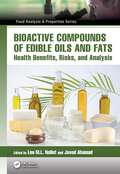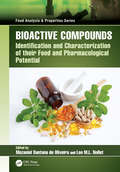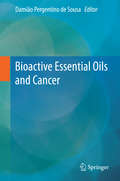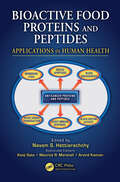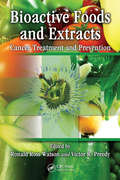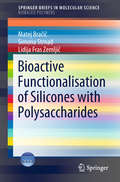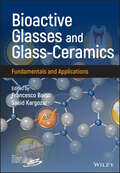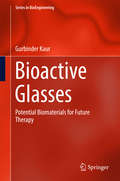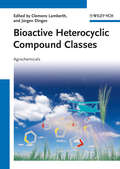- Table View
- List View
Bioactive Compounds from Food: Benefits and Analysis (ISSN)
by Javed Ahmad Nollet, Leo M. L.A bioactive compound is a type of chemical found in small amounts in plants and certain foods (such as fruits, vegetables, nuts, oils, and whole grains). Bioactive compounds have actions in the body that may promote good health. They are widely explored and investigated for their role in the prevention and treatment of various diseases, including cancer, cardiovascular disorders, and neurodegenerative disorders; thus, they are categorized as nutraceuticals. Examples of such bioactive compounds from food include lycopene, resveratrol, lignan, tannins, and indoles. Accordingly, the methods that are utilized to analyze these compounds for their identification, detection, and characterization are of great interest.In Bioactive Compounds from Food: Benefits and Analysis, spectrophotometric, fluorometric, chromatographic, enzymatic, and electrophoretic methods that are utilized to analyze the different bioactive compounds of food are comprehensively discussed. In addition, the merits and limitations of the existing methods of analysis for bioactive compounds from food are also highlighted. Further, the benefits of these bioactive compounds on human health as anti-oxidative, anti-cancer, anti-diabetic, anti-inflammatory, anti-infective, anti-hyperlipidemic, and anti-hypertensive agents are also discussed with detailed insight and critical analysis of the contemporary research carried out in this domain.Key Features: Explores the world of bioactive compounds in foods Discusses recent analysis techniques for bioactive compounds Includes a summary of the health benefits of bioactive compounds Provides different analysis methods involved in the identification and quantification of food bioactive compounds This book provides in-depth information and a comprehensive discussion on the human health benefits of food bioactive compounds and the different methods of analysis involved in the identification and quantification of food bioactive compounds.
Bioactive Compounds from Marine Extremophiles (SpringerBriefs in Microbiology)
by Lesley-Ann Giddings David J. NewmanThis SpringerBrief sheds new light on bioactive materials from marine extremophiles. It deals with all aspects of the chemical compounds produced by organisms living under extreme conditions that may have potential as drugs or lead to novel drugs for human use.
Bioactive Compounds from Marine Foods: Plant and Animal Sources (Institute of Food Technologists Series #64)
by Miguel Herrero Blanca Hernandez-LedesmaPart of the IFT Press series, this book reviews the myriad published information on bioactive components derived from marine foods, enabling researchers and product developers to select appropriate functional ingredients for new products. Chapters cover foods and food ingredients from both animal and plant marine sources, focusing on those which demonstrate biological properties and whose constituent compounds have been isolated and identified as potentially active. This book further addresses the biological activities of PUFAs (Polyunsaturated fatty acids), oils, phospholipids, proteins and peptides, fibres, carbohydrates, chitosans, vitamins and minerals, fucoxantin, polyphenols, phytosterols, taurine, amongst others. These components, found in a variety of marine-derived foods, have been demonstrated to have preventative properties with regard to hypertension, oxidative stress, inflammation, cardiovascular diseases, cancer and other human diseases. Extraction methods and analysis techniques are also addressed. Intended for food scientists, food technologists and food engineers in academia, industry and government, this book reviews the substantial quantity of current research in this fast-moving and commercially valuable sector of food and nutrition science.
Bioactive Compounds from Natural Sources: Natural Products as Lead Compounds in Drug Discovery
by Corrado TringaliThe first edition of Bioactive Compounds from Natural Sources was published in a period of renewed attention to biologically active compounds of natural origin. This trend has continued and intensified-natural products are again under the spotlight, in particular for their possible pharmacological applications. Largely focusing on natural products
Bioactive Compounds from Terrestrial Extremophiles (SpringerBriefs in Microbiology)
by Lesley-Ann Giddings David J. NewmanA discussion of the chemical compounds produced by organisms living under extreme conditions that may have potential as drugs or leads to novel drugs for human use. This SpringerBrief deals with bioactive materials from terrestrial extremophiles.
Bioactive Compounds in Agricultural Soils
by Lech Wojciech SzajdakThis volume looks at the impact that different cropping systems and tillage have on soil's biologically active substances. It considers how phytotoxins accumulate and can inhibit the development of cultivated plants. Coverage explores the continuous cropping of rye, crop rotation, no tillage, and conventional tillage. It offers a comprehensive, comparative approach to allelopathic plant-soil interactions. The authors focus on free and bounded biologically active substances such as amino acids, auxins, humic and fulvic acids, transient radicals, and enzymes in light sand soils fertilized with different mineral and organic fertilizers. The chapters address fundamental questions relevant to the environmental challenges we face today and will deal with in the future. The results involve asking basic questions motivated by soil's chemical and biochemical processes. The answers will lead to the improvement of the quality of soil's organic matter, which, in turn, can lead to increased crop yields. Readers will come to understand the relationship between ecological processes and environmental change on individual levels of biocomplexity as well as on systems in their entirety. The title is ideal for students and teachers for laboratory practical classes. Soil scientists, biochemists, chemists, plant ecophysiologists, "Natural Products" organic chemists, and other environmental scientists and specialists will also find it useful.
Bioactive Compounds in Bryophytes and Pteridophytes (Reference Series in Phytochemistry)
by Hosakatte Niranjana MurthyThis reference work provides a comprehensive overview of bioactive compounds investigated in bryophytes and pteridophytes and explores their nutritional, biological, pharmacological and ecological effects. Bryophytes are cosmopolitan lower plants that are rich in phytochemicals including fatty acids, tocopherols, phenolics, terpenoids. Additionally, these plants contain bibenzyls, bis-benzyls, and polyketides which have been demonstrated to have antimicrobial, anti-inflammatory, and cytotoxic activities. Pteridophytes are another group of lower vascular plants which were reported to have useful secondary compounds such as flavonoids, steroids, phenolics, terpenoids, and these plants impart medicinal values including antioxidant, antimicrobial, anti-inflammatory, anti-tumor, and anti-HIV activities.This book contains comprehensive contributions compiled by expert scientists and researchers in this field.The book offers a useful resource for plant biotechnologists, plant biologists, pharmacologists, pharmacists, food technologists, nutritionists, research investigators of the healthcare industry, academia, faculty, and students of biology and biomedical sciences. It also provides a strategic framework for further research and development activities of bryophytes and pteridophytes of the world.
Bioactive Compounds in Edible Mushrooms: Sustainability and Health Applications (Reference Series in Phytochemistry)
by Muhammad Akram Sylvester Chibueze Izah Matthew Chidozie OgwuThis handbook offers a comprehensive perspective of edible mushrooms' phytochemistry and explores the application of bioactive compounds from fungi in nutrition, medicine, and environmental sustainability. The book starts with an overview of edible mushrooms' bioactive compounds, followed by 5 parts covering the diversity, classification and taxonomy of common edible mushrooms, their environmental roles, sustainable harvesting practices, nutritional value and health benefits, and characterization and quality control of bioactive compounds. The book concludes with a perspective on emerging uses and trends in mushroom consumption utilization. In this book, readers will find valuable insights into the latest trends and developments in the field, including how diverse edible mushroom species are used in culinary, medicinal, and ecological contexts. Particular attention is given to functional foods and the chemical composition of an extensive range of bioactive compounds in edible mushrooms, such as beta-glucans, polysaccharides, ergosterol, phenolic compounds, and triterpenoids. The book also explores the environmental impact of mushroom cultivation and the economic opportunities arising from the increasing demand for edible mushrooms and their bioactive compounds. Techniques and strategies for preserving mushrooms, detecting adulteration in the mushroom market, characterizing bioactive compounds, and ensuring quality control in production and distribution are thoroughly discussed. This comprehensive overview serves as an invaluable resource for a wide range of professionals, including researchers, healthcare practitioners, nutritionists, food technologists, and anyone interested in tapping into the potential of edible mushroom bioactive compounds for the improvement of health, nutrition, and sustainability.
Bioactive Compounds in Fermented Foods: Health Aspects (Food Biology Series)
by Amit Kumar RaiThe volume reviews different types of bioactive components associated with food fermentation and their impact on human health. The diversity of microorganism responsible for the production of different types of fermented foods and beverages includes bacteria, yeasts, and fungi. Biotransformation of food constituent by microorganisms occurs during fermentation processes for the production of fermented food and in the gastrointestinal tract by gut microorganisms. This biotransformation results in production of specific bioactive compounds that are responsible for a wide range of health benefits. The bioactive compounds discussed in this book includes polyphenols, bioactive peptides, fibrinolytic enzymes, gama-amino butyric acids (GABA) exopolysaccharides, probiotic, prebiotic, symbiotic and antinutritional factors. These bioactive compounds are responsible for health benefits such as antioxidant, antihypertension, antimicrobial, cholesterol lowering, anticancer, obesity and antithrombotic properties. Advanced research in the field of food fermentation and their health benefits have resulted in commercialization of some of the fermented foods as functional foods. The traditional fermented foods consumed in different parts of the world and their health benefits are discussed in detail and the book concludes with recent advances in microbial transformation during gut fermentation and their impact on human health. There has been increasing interest among researchers on the proposed title in the last decade and the book brings updated information on research and advances in different types of health benefits exhibited by bioactive compounds in a wide range of fermented foods.
Bioactive Compounds in Mangroves and their Associates (Reference Series in Phytochemistry)
by Hosakatte Niranjana MurthyThis reference work offers a comprehensive overview of the chemistry and bioactivity of mangrove ecosystems, focusing on their specialized metabolites and biological activities. Through this volume, readers will discover the novel secondary metabolites from mangrove flora and their potential applications in various fields. The chapters cover a wide range of topics, including the phytochemistry and biological activities of specific mangrove species such as Acanthus ilicifolius, Avicennia marina, and Rhizophora mucronata. The chapter authors present an expert analysis of the bioactive compounds found in these species, exploring their pharmacological and toxicological properties. Particular attention is given to the anticancer activities of certain compounds, as well as the role of mangrove-associated bacteria and fungi in health management and bioremediation. Readers will also encounter discussions on the synthesis of nanomaterials from mangroves and their antimicrobial properties. This book is an essential resource for researchers, scholars, and practitioners in the fields of botany, pharmacology, and environmental science. It invites readers to think through critical questions about the ecological and medicinal significance of mangroves, offering diverse perspectives from expert contributors.
Bioactive Compounds in Underutilized Vegetables and Legumes (Reference Series in Phytochemistry)
by Hosakatte Niranjana Murthy Kee Yoeup PaekThis reference work provides a comprehensive overview of bioactive compounds found in underutilized vegetables and legumes around the globe. It describes their pharmacological, biological and health effects in detail, and provides a strategic framework for further research and global development activities. Using a consistent structure and divided into 9 parts based on the plant source, the book reviews bioactive compounds in various plant species. Each part opens with a leading article discussing the respective plant species. This book is a valuable reference resource for plant biologists and biotechnologists, pharmacologists, pharmacists, food technologists, nutritionists and other health professions working in academia and industry.
Bioactive Compounds in the Storage Organs of Plants (Reference Series in Phytochemistry)
by Hosakatte Niranjana Murthy Kee Yoeup Paek So-Young ParkThis book offers a comprehensive and authoritative review of bioactive substances found in plant underground stems, roots, rhizomes, corms, and tubers from all around the world. Tubers and starchy roots are plants that store edible starch content in underground stems, roots, rhizomes, corms, and tubers. They are a key source for both human and animal consumption and are rich in carbohydrates. They are widely used as industrial crops as well. Phytochemicals found in tubers and roots, such as phenolics, terpenoids, and alkaloids, have anti-inflammatory, anti-cancer, hypoglycemic, hypocholesterolemic, and antibacterial properties. Except for common potatoes, sweet potatoes, and cassava, the nutritional and health benefits of many tuberous crops have not yet been adequately investigated. This book sheds new insights into these topics by addressing several plant metabolites found in storage organs, which can be seen as scientifically neglected even though they have a high economic relevance as food and pharmaceutical sources. Divided into 6 parts, this book discusses how bioactive chemicals found in plant storage organs are synthesized and how their bioactive principles are specifically expressed in underground stems, roots, rhizomes, corms, and tubers. Additionally, each chapter includes background information on the plant, its parts, its nutritional makeup, chemical components, and biological functions. Given its breadth, the book appeals to a wide readership, from scholars through graduate and post-graduate students to professionals in the industry.
Bioactive Compounds of Edible Oils and Fats: Health Benefits, Risks, and Analysis (ISSN)
by Javed Ahamad M.L. Nollet, LeoEdible oils and fats are derived from plants and animals and have several health benefits. Edible oils and fats consist of many health-promoting bioactive compounds such as polyunsaturated fatty acids, monounsaturated fatty acids, polyphenols, flavonoids, phytosterols, vitamins, and inorganic compounds. The chemical compounds present in edible oils and fats are known for their possible health risks such as coronary heart disease and metabolic diseases, which is why there is a need to check the quality, purity, and safety of edible oils and fats. Bioactive Compounds of Edible Oils & Fats: Health Benefits, Risks, and Analysis provides an overview of different edible oils and fats, health benefits, associated risks, and analytical techniques for qualitative and quantitative guidelines for ensuring their quality and safety using modern analytical tools and techniques. This book will provide an important guideline for controlling quality, safety, and efficacy issues related to edible oils and fats.Key Features: Provides a detailed overview of different edible oils and fats of plant and animal origin, chemistry, and identification methods. Describes their health benefits, risks, and the use of different analytical techniques in quality control. Describes the applicability of sophisticated analytical techniques such as GC-FID, GC-MS, and HPLC for quality control of edible oils and fats. Emphasizes the use of recent techniques such as LC-MS and FTIR-chemometrics in the analysis and quality control of edible oils and fats.
Bioactive Compounds: Identification and Characterization of their Food and Pharmacological Potential (Food Analysis & Properties)
by Leo M.L. Nollet Mozaniel Santana de OliveiraThe potential of bioactive compounds can be unlocked through an in-depth examination of their properties in the book titled Bioactive Compounds: Identification and Characterization of their Food and Pharmacological Potential. This comprehensive volume provides an in-depth examination of the complexities of bioactive compounds, offering a meticulous exploration of their identification, characterization, and multifaceted roles in food and pharmaceutical applications.Through comprehensive analyses and illustrative case studies, this book elucidates the intricacies of isolating and understanding bioactive compounds, highlighting their multifaceted biological activities and therapeutic potential. Readers will gain insights into the latest techniques for extracting, purifying, and analyzing these compounds, crucial for identifying them in diverse natural sources.Each chapter elucidates the scientific principles that underpin the biological effects of bioactive compounds, also addressing practical considerations for their application in functional foods, nutraceuticals, and pharmaceutical formulations. The scope of these effects encompasses antioxidants and antimicrobials, anti-inflammatory agents, and other biological activities. This scholarly work bridges the gap between theory and application, making it an indispensable resource for researchers, academics, and professionals in the fields of food science, pharmacology, and biomedical research.Key Features Comprehensive Coverage: Explores bioactive compounds in depth, covering identification, characterization, and applications in food and pharmaceutical industries Cutting-Edge Research: Integrates the latest methods for extracting, purifying, and analyzing bioactive compounds, ensuring relevance and timeliness Practical Applications: Provides insights into developing functional foods, nutraceuticals, and pharmaceuticals with bioactive compounds, bridging theory and practice Multidisciplinary Approach: Addresses the roles of bioactive compounds from nutritional and therapeutic perspectives, appealing to researchers and professionals across fields Authoritative Resource: Offers a valuable reference for understanding and utilizing bioactive compounds in diverse scientific and industrial settings
Bioactive Dietary Factors and Plant Extracts in Dermatology (Nutrition and Health)
by Ronald Ross Watson Sherma ZibadiThe role of Bioactive Dietary Factors and Plant Extracts in Preventive Dermatology provides current and concise scientific appraisal of the efficacy of foods, nutrients, herbs, and dietary supplements in preventing dermal damage and cancer as well as improving skin health. This important new volume reviews and presents new hypotheses and conclusions on the effects of different bioactive foods and their components derived particularly from vegetables, fruits, and herbs. Primary emphasis is on treatment and prevention of dermal damage focusing on skin cancers with significant health care costs and mortality. Bioactive Dietary Factors and Plant Extracts in Preventive Dermatology brings together expert clinicians and researchers working on the different aspects of supplementation, foods, and plant extracts and nutrition and skin health. Their expertise provides the most current knowledge in the field and will serve as the foundation for advancing future research.
Bioactive Essential Oils and Cancer
by Damião Pergentino de SousaThis volume provides a general overview of the therapeutic potential of the essential oils in cancer and highlights some promising future directions. It integrates chemistry, pharmacology, and medicine while discussing bioactive essential oils in experimental models and clinical studies of cancer. The book is a valuable resource for all engaged in the study of natural products and their synthetic derivatives, particularly for those interested in academic research and pharmaceutical and food industries dedicated in the discovery of useful agents for the therapy or prevention of cancer.
Bioactive Extraction and Application in Food and Nutraceutical Industries (Methods and Protocols in Food Science)
by Tanmay Sarkar Siddhartha PatiThis volume details state-of- the art methods on sustainable food extractions. Chapters guide readers on traditional and novel extraction techniques, as well as exploring diverse sources of bioactive compounds. Additionally, chapters provide a holistic view of the field, catering to the needs of researchers, industry professionals, and students who are interested in this rapidly evolving area. Written in the format of the Methods and Protocols in Food Science series, chapters list necessary materials and methods for readily reproducible protocols. Authoritative and cutting-edge, Bioactive Extraction and Application in Food and Nutraceutical Industries aims to be a foundation for future studies and to be a source of inspiration for new investigations in the field.
Bioactive Factors and Processing Technology for Cereal Foods
by Jing Wang Baoguo Sun RongTsao CaoThis book summarizes the reported health benefits of bioactive factors in cereal foods and their potential underlying mechanisms. Focusing on potential mechanisms that contribute to the various effects of bioactive factors on obesity, diabetes and other metabolic diseases, it helps to clarify several dilemmas and encourages further investigations in this field. Intended to promote the consumption of cereal foods or whole cereal foods to reduce the risk of chronic diseases, and to improve daily dietary nutrition in the near future, the book was mainly written for researchers and graduate students in the fields of nutrition, food science and molecular biology.
Bioactive Food Proteins and Peptides: Applications in Human Health
by Navam S. HettiarachchyMany naturally occurring compounds from foods such as rice, vegetables, fruits, and animal products possess properties that help to slow disease progression, inhibit pathophysiological mechanisms, or suppress activities of pathogenic molecules. Proteins and peptides play significant roles in such activities and are gaining importance as nutraceutic
Bioactive Foods and Extracts: Cancer Treatment and Prevention
by Victor R. Preedy Ronald Ross WatsonThough there is considerable historical and anecdotal record for the use and efficacy of the cancer preventative properties of vegetables, fruits, and herbs, modern healthcare professionals require scientific evidence and verifiable results to make defensible decisions on the benefits, risks, and value of botanicals and their extracts in the preven
Bioactive Functionalisation of Silicones with Polysaccharides (SpringerBriefs in Molecular Science)
by Matej Bračič Simona Strnad Lidija Fras ZemljičThis book covers the functionalisation of silicone surfaces with polysaccharides to improve their antimicrobial and antifouling properties, thus reducing the implant-related infections. The authors describe how silicone surfaces were chosen because silicone exhibits excellent biocompatible properties and is already being used for medical implants such as catheters, breast implants, prosthetics etc. The potential of polysaccharides such as cellulose, chitosan, hyaluronic acid, and other natural substances such as natural surfactants as coatings for silicones are also discussed, their effects are evaluated. With the aging of the population, the number of medical implants is growing and with it the number of infections associated with the use of implants.
Bioactive Glass Materials for Biological Applications
by Gujjala Raghavendra P. Syam Prasad Dheeraj Kumar GaraBioactive Glass Materials for Biological Applications envelopes the complexities, challenges, and advancement in developing a new class of bioactive materials for versatile applications. It outlines the materials involved, bioactivity against bioinert materials, phase change materials, biomolecular nature, synthetic biodegradable polymers, and bioactive glasses. The processing techniques of the bioactive glasses for versatile applications are also covered. A comprehensive focus is on the review of additive manufacturing routes suitable for biological applications with the ability to print various bioactive materials whilst carrying living cells.Features: Introduces bioactive glass materials and their nature aimed towards biological applications Covers how biological materials behave in vivo and in vitro for tailoring materials and sensitivity to the biological environment Explores relevant additive manufacturing platforms Reviews new chemistry and molecules for therapeutic and drug delivery applications alongside bone tissue and regenerative medicine Spotlights the future scope of bioactive glass nanoparticles, their limitations, and research focus areas This book is aimed at graduate students and researchers in glasses and ceramics and biomaterials.
Bioactive Glasses and Glass-Ceramics: Fundamentals and Applications
by Francesco BainoBioactive Glasses and Glass-Ceramics Fundamentals and Applications A Comprehensive and Critical Overview of Bioactive Glasses and Glass-Ceramics Bioactive glasses and glass-ceramics are a versatile class of biocompatible materials that have an astonishing impact in biomedicine. Bioactive Glasses and Glass-Ceramics: Fundamentals and Applications presents topics on the functional properties, processing, and applications of bioactive glasses and glass-ceramics. The primary use of bioactive glasses and glass-ceramics is to repair bone and dental defects; however, their full potential is yet to be fulfilled. Many of today’s achievements in regenerative medicine and soft tissue healing were unthinkable when research began. As a result, the research involving bioactive glasses and glass-ceramics is highly stimulating and continuously progresses across many different disciplines including chemistry, materials science, bioengineering, biology, and medicine. Topics relating to these disciplines and covered within the work include: Fundamentals on bioactive glasses and glass-ceramics, bioactive glasses in today’s market, and improvements and challenges for the future Scalability and other issues when taking bioactive glass from lab to industry/commercialization applications, plus clinical challenges Trending topics such as bioactive glass porous scaffolds, additive manufacturing of bioactive glasses, and nano-engineering of bioactive glasses The various bioactive glass compositions which have been developed as medical products in an expanding range of forms and applications Bioactive Glasses and Glass-Ceramics: Fundamentals and Applications serves as a comprehensive and complete reference work on bioactive glasses and glass-ceramics for research and development (R&D) materials scientists, surgeons, and physicians, and leadership at glass and medical companies. Students and professors in fields of study pertaining to the aforementioned disciplines will also derive value from the work.
Bioactive Glasses: Potential Biomaterials for Future Therapy (Series in BioEngineering)
by Gurbinder KaurThis book describes the history, origin and basic characteristics of bioactive materials. It includes a chapter dedicated to hydroxyapatite mineral, its formation and its bioactive properties. The authors address how cytotoxicity is a determining step for bioactivity. Applications of bioactive materials in the contexts of tissue regeneration, bone regeneration and cancer therapy are also covered. Silicate, metallic and mesoporous glasses are described, as well as the challenges and future prospects of research in this field.
Bioactive Heterocyclic Compound Classes: Agrochemicals
by J Clemens Lamberth Uuml Rgen DingesThe chemistry of heterocycles is an important branch of organic chemistry. This is due to the fact that a large number of natural products, e. g. hormones, antibiotics, vitamins, etc. are composed of heterocyclic structures. Often, these compounds show beneficial properties and are therefore applied as pharmaceuticals to treat diseases or as insecticides, herbicides or fungicides in crop protection. This volume presents important agrochemicals. Each of the 21 chapters covers in a concise manner one class of heterocycles, clearly structured as follows: * Structural formulas of most important examples (market products) *Short background of history or discovery * Typical syntheses of important examples * Mode of action * Characteristic biological activity * Structure-activity relationship * Additional chemistry information (e.g. further transformations, alternative syntheses, metabolic pathways, etc.) * References A valuable one-stop reference source for researchers in academia and industry as well as for graduate students with career aspirations in the agrochemical chemistry.
